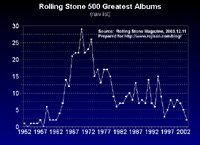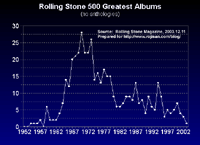my post on the death of the album generated a bit of interest out there (thanks and a nod to robert kaye, grant henninger and the people who left comments).
i thought i’d take a little time today to see if there was another way to figure out this death of the album thing. rolling stone provided some data to check out – the 500 greatest albums of all time. certainly, there is rich material here. there are a lot of interesting things in this list, but since i’m coming from a “death of the album” perspective, i thought i’d go dig up release dates and make a pretty chart. it looks like this:

the earliest album to make the rolling stone list was released in 1952 (#276, Anthology of American Folk Music), and that introduces a problem with this list – anthologies. if i pull the “greatest hits” and other obvious re-releases, it leaves 465 albums. this second chart reveals an interesting bias – a disproportionate number of the more-recent “greatest albums” are collections of older material.

when you combine this picture with the quick analysis of itunes data, it does look like a pretty grim situation for the album. maybe not all the way dead, but mostly dead.
we could speculate about the pattern here and make observations about how it takes time to recognize greatness in art, and how it takes time for artists to mature to the point where they make great art, and that explains why the peak of “great albums” happened 30 years ago. i think it’s simpler than that. the industry has made a major shift from “organic” to “directed” music production. the development cycle at major labels is so short now that there is no room for a “growth” album. you’re signed, you make a hit, pump it as hard as possible, lather, rinse, repeat. if you miss anywhere along the cycle, you’re gone. the industry of music can’t afford to wait around for two or three albums while you find your greatness. outside the industry of music, i think there’s still a lot of room for musicians to develop with their audiences, but that’s getting a bit off topic. back to this album thing.
a lesson here is that there are two ways to get onto the rolling stones greatest albums of all time list – you can make a great album (93% of the list), or you can make a long, great career and turn that into an album (the other 7%).
i made light of it (and so did mick, apparently), but there’s a reason i had to say something about the knighting of the lead stone. sir mick happened because the rolling stones have a decades-long relationship with their fans. mick jagger has gone from from rebel bad boy to getting knighted by the same queen (well, indirectly – i understand prince chuck did the actual honors) the stones were screaming about in the 60’s.
putting together a few hit songs and filling out an “album” with garbage serves the record label well, but it doesn’t serve the musicians well. the hit is there (with some follow-up potential, of course), so there’s money to be made, and they will pull every string available to make it. but, if you alienate your fans by making them feel ripped off (gee, 2/3rds of this album sucks – why did i pay so much for it?) or inconvenienced (skip track 2. skip track 5…), then they won’t come back and buy your next release. they won’t come to your concert. they won’t keep you fed. you (the musician) broke the relationship with your audience, and that is the hard limit on your career.
your label, on the other hand, has a thousand people just like you waiting for their chance. the label has to deal with investors and quarterly financial statements and other short-term business things, but you need to keep some focus on the long term – you really don’t get to start over too many times in this business of music. this is your career (and diet) on the line. do it right.
for the musician, perhaps the broader question is: “should i worry about albums at all?” i’ll go ahead and answer that one for you – maybe. there is no perfect model. if you can produce a great album – an album that is coherent, that works for you, that builds a relationship with your audience, then yes. worry about it a great deal, and do it. do it well, do it right, and do it with 10 or 15 or even 50 songs if that’s what it takes.
on the other hand, if you don’t have that many solid tracks, or if you can’t make it coherent, or can’t afford to produce all of them right now, then don’t sweat the album thing. work with what you have. play your strengths. build that life-long relationship with your audience some other way. do it one concert at a time, or 5 great tracks at a time, or one person at a time. we (your fans) are smart enough to work with you on this, and we will respect you in the morning if you respect us today.
then again, we’re also smart enough to realize when we’re getting the raw end of the deal, and there are plenty of other bands out there for us to fall in love with…
…but have fun storming the castle…

